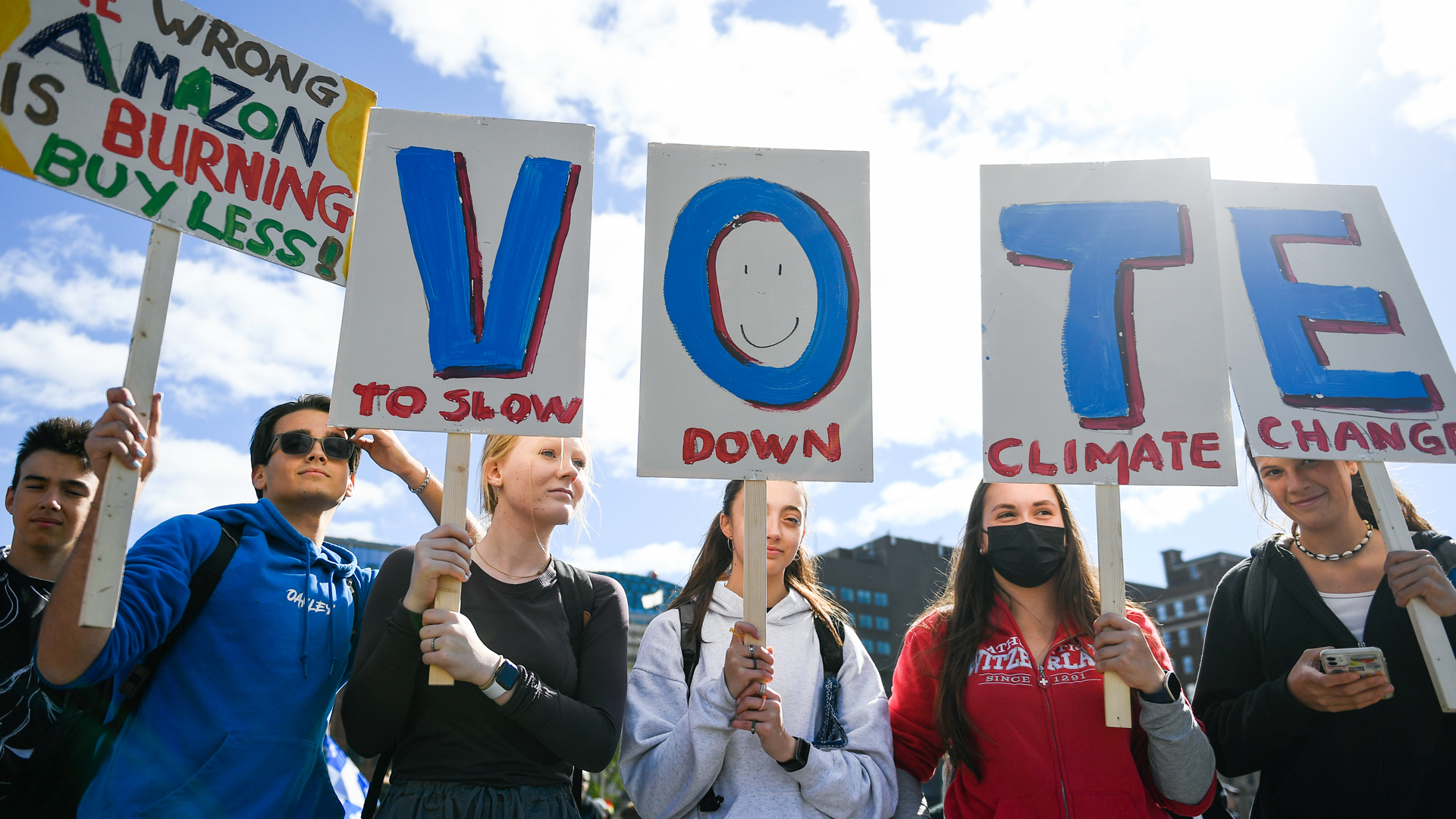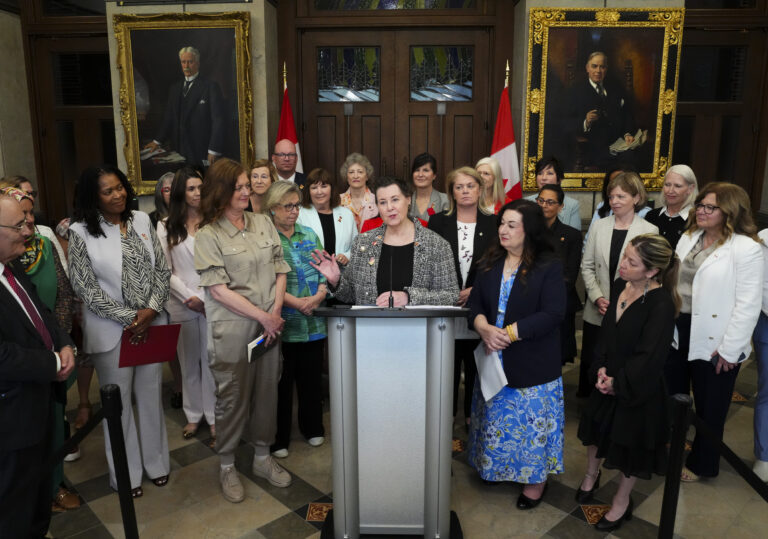In a time of increasing polarization, disillusionment and democratic decline, Canada needs a reimagined legislative direction rooted in both principle and practicality. One of the boldest steps the government could take would be to offer Canadians as young as 16 or 17 the right to vote.
Canada would be following Britain where the government announced earlier this month that it wants to lower the voting age to 16 from 18 — a change being characterized as the “biggest reform” to the country’s electoral system in almost 35 years. Canadian Sen. Marilou McPhedran renewed her call for Canada to lower the voting age after putting forward a bill in May, saying it’s a matter of logic and fairness.
This is not to suggest Canada’s voting age be lowered unconditionally. A more equitable approach would be to reward young people with an early turn at the polls in exchange for their civic engagement. They could do this by passing a civic knowledge test, completing community work or being recognized for exceptional activism or public service. This would replace our current arbitrary voting age of 18 with one based on action, responsibility and competence.
The democratic gap and the civic cost
The need to engage more youth in politics is clear. In the 2021 federal election, turnout of eligible voters between 18 and 24 fell from a peak of 57.1 per cent in 2015 to 46.7 per cent, by far the lowest of any age group. Official data from last April’s election has yet to be released.
Add to this a YMCA poll last year that showed 68 per cent of Canadians between 18 and 34 reported feeling a lack of belonging in society. A housing poll released by Scotiabank found 55 per cent of millennials (29 to 44 years old) and 58 per cent of Gen Z (13 to 28) believed buying a home is unattainable.
These aren’t just statistics. They’re signals of democratic fatigue and generational alienation.
And yet youth are mobilizing. From climate marches to mental-health advocacy, they’re organizing, leading and building Canadian society. Many youth-led organizations — including Young Politicians of Canada (YPC) and Young Diplomats of Canada (YDC) — have a proven record in civic engagement and leadership. The problem isn’t apathy. It’s a political system that hasn’t caught up with their energy or commitment.
Why not just lower the voting age?
Calls to lower the voting age to 16 have gained traction globally. More than 25 countries and regions are experimenting with or enacting such reform. A study in Germany showed that young people, when given the chance, vote as rationally and thoughtfully as adults. Scotland’s 2014 independence referendum included 16- and 17-year-olds, and a year later they were given the vote in all Scottish elections. In Austria, a younger voting age has correlated with increased voter turnout and long-term civic engagement. Belgium allowed younger teens to vote in the European Parliament election last year.
But these successes have not been automatic. What made them work was education, mentoring of students by instructors and political will. Without action and real policy changes to back it up, the idea of lowering the voting age risks becoming symbolic.
That’s where the “all-contributing principle” (ACP) comes in. It’s an idea I’ve developed that everyone — regardless of age — has the potential and responsibility to contribute meaningfully to society when given support, recognition and opportunity. It doesn’t mean just handing young people the vote, but inviting them to earn it. This would help foster the very habits that democratic institutions are trying to cultivate: knowledge, commitment and civic mindedness.
A philosophical foundation
The principle is grounded in a tradition of political theory that views voting not as a passive entitlement, but a civic act with responsibilities. John Stuart Mill, the 19th-century British philosopher and politician, warned of what some later scholars have viewed as the “tyranny of the ignorant.” Mill championed democracy, but also argued that political rights should be accompanied by education and competence.
While Mill’s vision leaned elitist, modern adaptations like Prof. Jason Brennan’s “competence principle” argue that citizens should demonstrate a minimal level of political understanding, just as jurors or professionals must meet standards before assuming responsibility.
ACP takes this idea and retools it. It avoids elitist pitfalls by offering several ways for young people to gain the vote. It builds on the idea of participatory citizenship as earned through contribution, not merely inherited by age.
Critics might say this violates democratic inclusivity. But democracies already place conditions on voting: minimum age, residency and, in some cases, disqualification due to criminal convictions. The all-contributing principle adds an option — not a barrier — that complements rather than replaces universal voting at 18.
What ACP looks like
The principle would allow 16- and 17-year-olds the early right to vote by meeting a standard designed and monitored by an independent federal government agency collaborating with provinces and territories. Options could include:
- Civic knowledge: Teens would need to pass a standardized, non-partisan test with questions on the Canadian government, citizen rights and responsibilities. The score would be based out of 100.
- Civic engagement: Verified volunteer work or community service would also be scored out of 100. Certain paid full- or part-time jobs for youth from low-income households would also qualify
- Exceptional contributions: Youth could be nominated for their public service, activism or innovation. A non-partisan national board and its provincial sub-committees could select from nominees who would be awarded a youth version of the Order of Canada.
A combined score of 150 out of 200 in the first two areas, or official recognition in the third, would secure the right to vote. Importantly, this approach would be voluntary. Youth uninterested or unready would vote as usual at 18. But for those already demonstrating civic commitment, being allowed to vote at a younger age would recognize their ability and right to make important choices affecting their lives.
Acknowledging youth
The all-contributing principle isn’t about burdening youth, but rather about validating their contributions and motivating them to contribute to society. It would not benefit those only from certain backgrounds, but offer diversity by including youth from under-represented regions and socio-economic groups. It would invite all young Canadians to become architects, not just inheritors, of our democracy.
This is not idealistic theory. Statistics from Employment and Social Development Canada show that 46 per cent of Canadians between 15 and 30 already did volunteer work in 2022. A 2021 a survey for the Rideau Hall Foundation found that 78 per cent of youth respondents wanted to learn how to contribute to society. The cornerstone is already there to build a bridge between civic engagement and political power.
A call to act
The proposed principle wouldn’t weaken democracy. It would deepen it by linking rights to responsibility and inclusion to action. Young Canadians aren’t asking for charity. They’re asking for a meaningful stake in the decisions shaping their lives.
The future isn’t something Canadian youth inherit. It’s something we build together with all members of society. And that starts by trusting young people to help lead.












